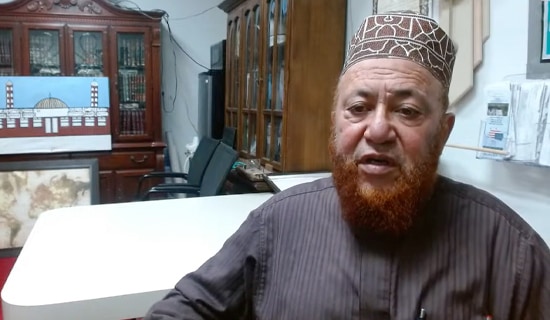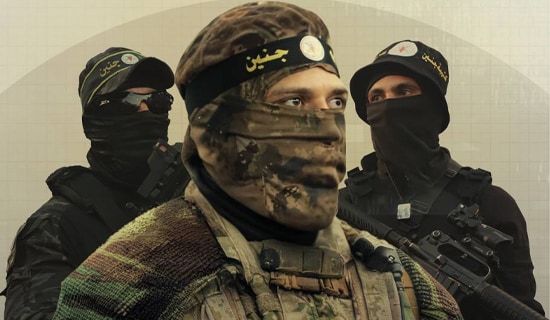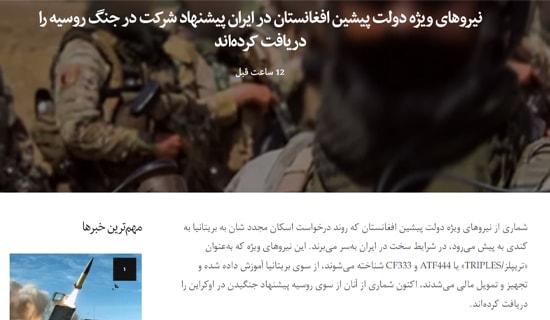Soon after taking power in the 1921 Persian coup d'état, Reza Shah embarked on a campaign to impose a uniform Persian identity as part of his ambition to replace the heterogeneous Dowlat-e 'Aliyye-ye Irân ("Sublime State of Iran") of the Qajar dynasty with a unified, territorially bounded Kešvar-e Šâhanšâhi-ye Irân ("Imperial State of Iran"). This empire-state was to be transformed into a nation-state of "Persian-speaking Shi'ite Iranian people"[1] through forced assimilation and deportation campaigns, which spurred many rebellions in the ethnic regions of Iran.[2]

(Source: Twitter.com/HusenYazdanpana)
During the first half of the 20th century, when Iran underwent this transition, according to Iranian scholar Mehrzad Boroujerdi, "perhaps no more than 50 percent of Iranians actually spoke Persian" and "close to 80 percent of Persian-speakers themselves were illiterate." He added that "Even though Persian became the language of the political and literary elite, it never replaced the local languages... Needless to say, the campaign to define 'Persian' as the pillar of Iranian nationalism alienated Azeri Turks, Kurds, and other ethnic minorities in Iran."[3]
The Islamic Republic continued to treat its minority populations more as subjects than as citizens. Like the Pahlavi regime before it, the Islamic Republic has sought to Persianize the "Iranian national identity," while also strengthening the Shia component to it. The Persian nationalists have attempted to equate "Iran" with "Persia" – which is the southern region of Iran – and "Iranian" with "Persian." Persian language, music, history, and culture are called "national," while the languages and cultures of other ethnic groups are called "tribal" and "local."
Although Iranian ruling elites were successful in "colonizing" ethnic regions through violent repressions, they failed in forging a genuine sense of national cohesiveness among Iran's ethno-nations that never have embraced or integrated fully within the Iranian society. This has become more evident during the current nationwide protests, in which the marginalized ethnic minorities, which are leading the uprising, face the harshest crackdowns by regime security forces.
However, many Persians inside and outside Iran – including the figures that have emerged as representatives of Persian opposition in the diaspora – refuse to acknowledge the plight of ethno-nations and their legitimate demands of basic human and ethnic rights. The minoritized ethnic groups that comprise almost half of Iran's population are completely left out of discussions about Iran and the political future of the country. This can be understood as a political strategy to deprive ethnic groups of claiming nationhood and self-governance but also subsuming them under the imposed Persian-centered Iranian identity.
The erasure of minorities' demands and identities by Persian nationalists is a deliberate and systematic attempt to portray the uprising as an "Iranian" revolution against the "Islamic Republic," thus channeling the efforts of minorities toward a "regime change" that would retain the Persian hegemony in Iran: one language, one culture, one history, and one identity.
Meanwhile, the minorities criticize these politics of denial and emphasize that their struggle is for establishing independent ethno-states or a decentralized entity, based on democratic confederalism, which could work as a temporary, transitional, intergovernmental project in post-Ayatollah Iran until the establishment of new ethno-states in the Kurdistan, Balochistan, Khuzestan, and Caspian regions, based on mutual respect and common interests.[4]
In this regard, in November 2022, Hussein Yazdanpana, Head of the Kurdistan Freedom Party (PAK), whose group endured "heavy losses" in Iranian missile and suicide drone attacks on the bases of Kurdish-Iranian political parties and residential areas in southern Kurdistan (Iraqi Kurdistan) in September, said in a video: "In 1979, when the Islamic Revolution spread across Iran and the majority of Iranians followed Khomeini, Kurdistan took a different path." He then stressed: "Today, our slogans must stem from our sufferings and demands, which is undoubtedly the independence of Kurdistan. Iran and the whole world must listen to the demands and recognize the rights of the Kurdish people."[5]
Also, in response to several tweets by prominent Iranian opposition figures on New Year's Eve, who mentioned that 2023 will be the year of victory for the "Iranian nation,"[6] Yazdanpana remarked: "There is no nation called 'Iranian Nation.' There are so many nations with different languages, identities, lands, history, and feelings in 'Multinational Iran.' Denying this fact is a complete contradiction to the freedom-loving spirit of the uprising of the Iranian nations against the Islamic Republic. May the year 2023 be blessed for the nations of Iran."[7]
*Himdad Mustafa is a Kurdish scholar and expert on Kurdish and Iranian affairs.
[1] Jeffrey Mankoff. Empires of Eurasia: How Imperial Legacies Shape International Security. Yale University Press, 2022. P.157.
[2] The ethnic regions of Iran, namely Gilan, Luristan, Balochistan, Kurdistan, Khuzistan and Azerbaijan.
[3] Mehrzad Boroujerdi. Contesting Nationalist Constructions of Iranian Identity. Critique Critical Middle Eastern Studies 7(12), 1998, pp.43-55
[4] See MEMRI Daily Brief No. 426, A Roadmap Towards Confederalism For The Future Of Iran, November 3, 2022.
[5] Twitter.com/HusenYazdanpana/status/1593009068763148288?t=eNDBUJsORB5Pg9Jxd-ibkw&s=19, November 17, 2022.
[6] On December 31, 2022, renowned Iranian opposition figures in the diaspora issued a New Year's message, which stated: "The year 2022 was a glorious year of solidarity for Iranians of every belief, language and orientation. With organization and solidarity, 2023 will be the year of victory for the Iranian nation. The year of freedom and justice in Iran." The message was released simultaneously on social media by dissident Masih Alinejad, the son of the ousted shah Reza Pahlavi, actress Golshifteh Farahani, actress Nazanin Boniadi, football star Ali Karimi, social activist Hamed Esmaeilion and actress Zar Amir Ebrahimi.
[7] Twitter.com/HusenYazdanpana/status/1609982185443926016?cxt=HHwWgIC9oZCR59csAAAA, January 2, 2023.





